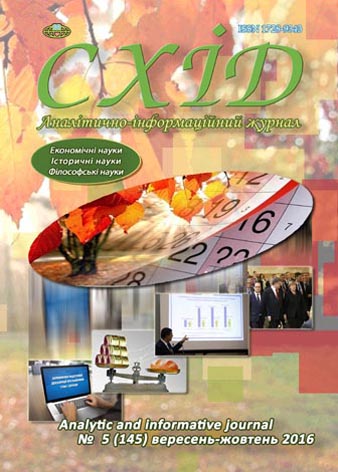Independent Ukraine in Russian geopolitical concept in the 1990-s
DOI:
https://doi.org/10.21847/1728-9343.2016.5(145).83775Keywords:
Ukraine, Russia, geopolitics, foreign policyAbstract
In the article the attitude of the social and political elite to the existence of independent Ukraine. For this purpose analyzed the major geopolitical concepts and legal documents on foreign policy that defined the Russian policy on post-Soviet states during the 1990s. Common to all these works have analyzed the declaration of the Russian Federation Centre the former Soviet Union and former Soviet territory republics - the Russian zone of vital interests. Also, attention is focused on the plans of the Russian social and political elite to restore the former USSR new association with the dominant role of Russia in it.
The emphasis is on the negative perception of independence of Ukraine in the Russian social and political thought. Also accented Russian politicians to substantiate the need to restore political unity of the Slavic peoples, to return the "natural" geopolitical status of Russia, provide a geopolitical control over the territories that were part of the USSR. Political, economic, military and informational relationship between Ukraine and Russia in terms of Russian politicians, the long-term national interests of Russia. On the contrary same integration of Ukraine to other international entities threat to the Russian Federation and the plan of building a "Great Russia".
The influence of these concepts on the formation of foreign policy strategy, particularly in the current policy of Russia towards Ukraine. It is assumed that it is the political rhetoric of the Russian national patriots and left gave impetus to the efforts of great practical implementation of their geopolitical goals, including through the brutal interference in the internal affairs of Ukraine.Downloads
References
Bolshakov, V. (1995), Meeting with lіder Russian Communists. Phenomenon Zyuganov, Sovetskaya Rosssya, October 24 (rus).
Gadzhyyev, K. (1997), Geopolitics, Mezhdunarodnyye otnoshenyya, Moscow, 383 p. (rus).
Halchynskyi, A. S. (2002), Ukraineat the crossroads of geopolitical interests, Znannya Ukrayiny, Kyiv, 256 p. (ukr).
Halchynskyi, A. (1999), Ukraine: Towards the Future, Osnovy, Kyiv, 220 p. (ukr).
Horbulin, V. P. and Kachynskyi, A. B. (2009), Fundamentals of National Security Ukraine, Intertekhnolohiya, Kyiv, 272 p. (ukr).
Horbulin, V. Proceedings before the second anniversary of the Russian aggression against Ukraine, available at: http://uacrisis.org/ua/40347-gorbulin-tezy (ukr).
Dugin, A. (1997), Basics of geopolitics. Russia’s geopolitical future. Arktoheya, Moscow, 559 p. (rus).
Zhyrinovskiy, V. (1997), Ideology from Russia, Moscow, 37 p. (rus).
Zhyrinovskiy, V. (1993), Last Thrust to the South. Moscow, 146 p. (rus).
Zatulin, K. and Sevastyanov, O. (2001), Two years after the fraud in the last century, Nezavisimaya gazeta, №17, 01 February (rus).
Zatulin, K. (1998), And the defeat from victory you yourself should not be distinguished?, Nezavisimaya gazeta, 21 January (rus).
Zatulin, K. (1996), Ukraine Test. Examination on national foreign policy, Nezavisimaya gazeta, 15 May (rus).
Zatulin, K. (1999), Does will have to lie to two people of the friendship between the two states?, Moskovskaya Pravda, 17 February (rus).
Zyuganov, G. (1993), The revival of Russian and international situation. Pravda, 10 December (rus).
Zyuganov, G. (1997), Geography of victory. Fundamentals of Russian geopolitics, Moscow, 303 p. (rus).
Kiryakov, P.O. & Luskalova, K.Ye. & Lytvynenko, V.I. (1998), Ukrainein Russian geopolitychnyh concepts, Stratehichna panorama, № 3-4, 51-59 (ukr).
Kolosov, V. (1998), Prospects of Russian-Ukrainian relations, Znanie, Moscow, 354 p. (rus).
Concept of Foreign Policy of Russian Federation (1993), Diplomaticheskiy vestnyk, № 1-2, pp. 3-23 (rus).
The Russian Federation National Security Concept. Approved by Presidential Decree of 17 December 1997. № 1300, Rossiyskiye vesti, 25 December (rus).
Kulchytskyi, S. and Parakhonskyi, B. (2004), Ukraine and Russia historically: modern Ukrainian state-building process, Naukova dumka, Kyiv, 328 р. (ukr).
Lukin, V. (1995), Election of 1995. The foreign policy views of parties. Mezhdunarodnaya zhyzn, №11-12, pp. 5-32 (rus).
Migranian, A. (1997), Russiain Search of Identity (1985-1995), Mezhdunarodnyye otnosheniya, Moscow, 411 p. (rus).
Petrovskyi, V.V. (2003), Ukrainian-Russian relations in contemporary Western scientific literature (1991-2001), Kharkiv, 492 p. (ukr).
Programma realizatsii strategicheskogo kursa Rossiyskoy Federatsii s gosudarstvamy-uchastnikami CIS. Utverzhdena Postanovlenyiem Pravytelstva RF ot 6 marta 1996 (rus).
Solzhenitsyn, A. (1998), Russiain Collapse, Moscow, 208 p. (rus).
Strategicheskiy kurs Rossii s gosudarstvami-uchastnikami Sodruzhestva Nezavisimykh Gosudarstv. Utverzhden Ukazom Prezidenta RF ot 14 sentyabrya 1995. № 940 (rus).
Tkachenko, V. (2016), Russia: the identity of the aggressor, Kyiv, 256 p. (ukr).
Levyk, B. (2012), Ukraineand Russia- a modern military and historical dimension, Skhid, no. 4(118), 98-104, аvailable at: <http://skhid.com.ua/article/view/16533 (ukr).
Levyk, B. (2016), Change of the geopolitical choice of independent Ukraine (current historical aspect), Skhid, no. 4(144), 57-61. doi: 10.21847/1728-9343.2016.4(144).77988 (ukr).
Downloads
Published
How to Cite
Issue
Section
License
Copyright (c) 2016 Oleh Kostiuk

This work is licensed under a Creative Commons Attribution-NonCommercial-NoDerivatives 4.0 International License.
1. Authors bear responsibility for the accuracy of facts, quotations, numbers and names used.
2. Manuscripts are not sent back.
3. The publisher does not always agree with the authors' opinion.
4. The authors reserve the right to authorship of the work and pass the first publication right of this work to the journal under the terms of a Creative Commons Attribution-NonCommercial-NoDerivatives 4.0 International License. This license allows others to distribute (copy) the published work for non-commercial purposes, provided there is mandatory attribution to its authors and a link to the first publication in our journal.
5. The authors have the right to conclude separate supplement agreements that relate to non-exclusive work distribution in the form in which it has been published by the journal (for example, to upload the work to the online storage of the journal or publish it as part of a monograph), provided that the reference to the first publication of the work in this journal is included.

